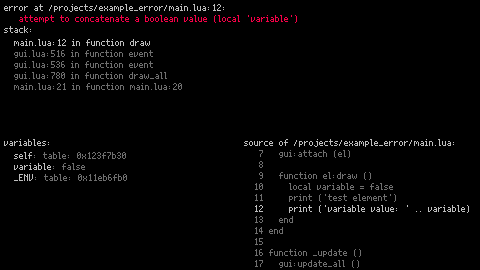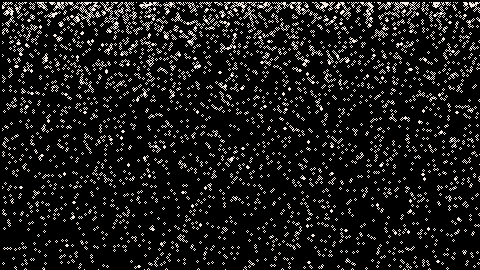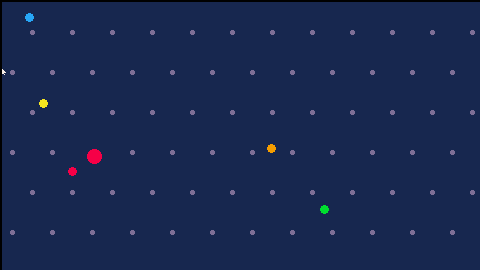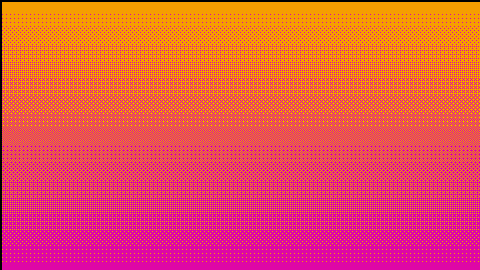
hi, i wrote an interactive error screen for picotron! on error, it lets you explore the stack, local variables, and shows the source location where the error occurred. use arrows to go up and down the stack, the mouse wheel to scroll, and click on table variables to expand them. you can also press space or x to toggle small-font mode.
download: https://github.com/snowkittykira/picotron-error-explorer
to use it, download error_explorer.lua and include it after defining your _init, _update and _draw functions.
it replaces these functions which wrappers that call them in a coroutine, so that when errors happen the coroutine can be inspected. on error, it does its best to reset the graphics state, but there might still be cases where this fails so let me know if you run into any issues!



hi, i'm loving picotron so far! i just wanted to report some issues using coroutines.
when using coroutine.resume, it can sometimes return early when the coroutine runs for a while due to how picotron does timeslicing. from reading head.lua, i learned that using coresume instead of coroutine.resume fixes this, which makes me think maybe coroutine.resume should be replaced with it. another more minor issue is that coresume only returns the first value of a multiple-value return/yield from the coroutine, and not any more.
here's a simple test case:
local function long_running_coroutine ()
for i = 1, 100 do
cls()
end
return 1, 2
end
function working ()
local c = coroutine.create (long_running_coroutine)
coresume (c)
assert (coroutine.status(c) == 'dead', 'this works')
end
function not_working ()
local c = coroutine.create (long_running_coroutine)
coroutine.resume (c)
assert (coroutine.status(c) == 'dead', 'this doesn\'t work')
[ [size=16][color=#ffaabb] [ Continue Reading.. ] [/color][/size] ](/bbs/?pid=147216#p) |


hi! when i use lua i usually use a library that prevents me from accidentally using/setting globals that aren't already defined, in order to cut down on typos. i've collected a small whitelist of globals that need to be available for picotron. i noticed in terminal.lua there's a comment saying it's not supposed to set any globals, so i thought i'd report them in case they should be fixed.
here's what i have so far in my whitelist:
-- terminal.lua cproj_draw cproj_update _ _is_terminal_command k res -- gui.lua drag_t |
and here's the full script i'm using to protect globals in case it's helpful:
-- if you're using include(), include this after including everything else,
-- since most included modules will need to assign global variables on load
-- these globals are needed by picotron
_init = _init or false
_draw = _draw or false
_update = _update or false
-- these are used by the picotron terminal
cproj_draw = cproj_draw or false
cproj_update = cproj_update or false
_ = _ or false
_is_terminal_command = _is_terminal_command or false
k = k or false
res = res or false
-- gui needs these
drag_t = drag_t or false
local function unknown_variable (t, k)
error (debug.traceback ('unknown variable ' .. tostring (k), 2))
end
setmetatable (_G, {
__index = unknown_variable,
__newindex = unknown_variable,
}) |
it's probably a good idea not to use it in finished carts because then changes to picotron might break them
I've been writing an archetype-based ecs (entity-component-system) library for picotron and i put it up on github!
https://github.com/snowkittykira/picobloc
It keeps component values in picotron userdata so that for simple cases like velocity / acceleration, you can use userdata operations to make it very fast! As a result it is probably slightly harder to use than the other ecs libraries available for picotron right now (which use tables to represent entities), but should allow some pretty good optimizations.
you can see the example from the readme running here:
https://www.lexaloffle.com/bbs/?tid=141824
and my plink cart also uses it, though it doesn't really need the optimization:
i'm trying to use :copy when growing a userdata:
local a = vec(1, 1) local b = vec(0, 0, 0) a:copy (b) print(b) -- b is still zero |
i figured maybe the vectors needed to be the same size but neither of these work either:
local a = vec(1, 1) local b = vec(0, 0) local c = vec(0, 0) a:add (0, b) a:copy (c) print(a) print(b) print(c) |
not sure if this is a bug in picotron or just in the docs, but in the gfx pipeline doc it says that the colour tables are accessed like this:
out_col = peek(0x8000+coltab*0x1000 + target_col*64 + draw_col) |
but to get the colour table working properly in practice i have to swap the target and draw colours like this:
function c_set_table (draw_color, target_color, result) poke (0x8000 + 64 * draw_color + target_color, result) end |
thought i'd post a demonstration of generating simple dither patterns for fillp in case it was useful to anyone!
feel free to use under the CC license or mit license or public domain
dither.lua:
-- threshold map from https://en.wikipedia.org/wiki/Ordered_dithering
local threshold_map = {
0, 8, 2, 10,
12, 4, 14, 6,
3, 11, 1, 9,
15, 7, 13, 5,
}
local function make_mask (value)
local mask = 0
for i = 1, 16 do
mask = mask * 2
if threshold_map [i] >= value then
mask = mask + 1
end
end
return mask
end
local dither_masks = {}
for i = 0, 16 do
dither_masks[i] = make_mask (i)
[ [size=16][color=#ffaabb] [ Continue Reading.. ] [/color][/size] ](/bbs/?pid=145139#p) |







 4 comments
4 comments






